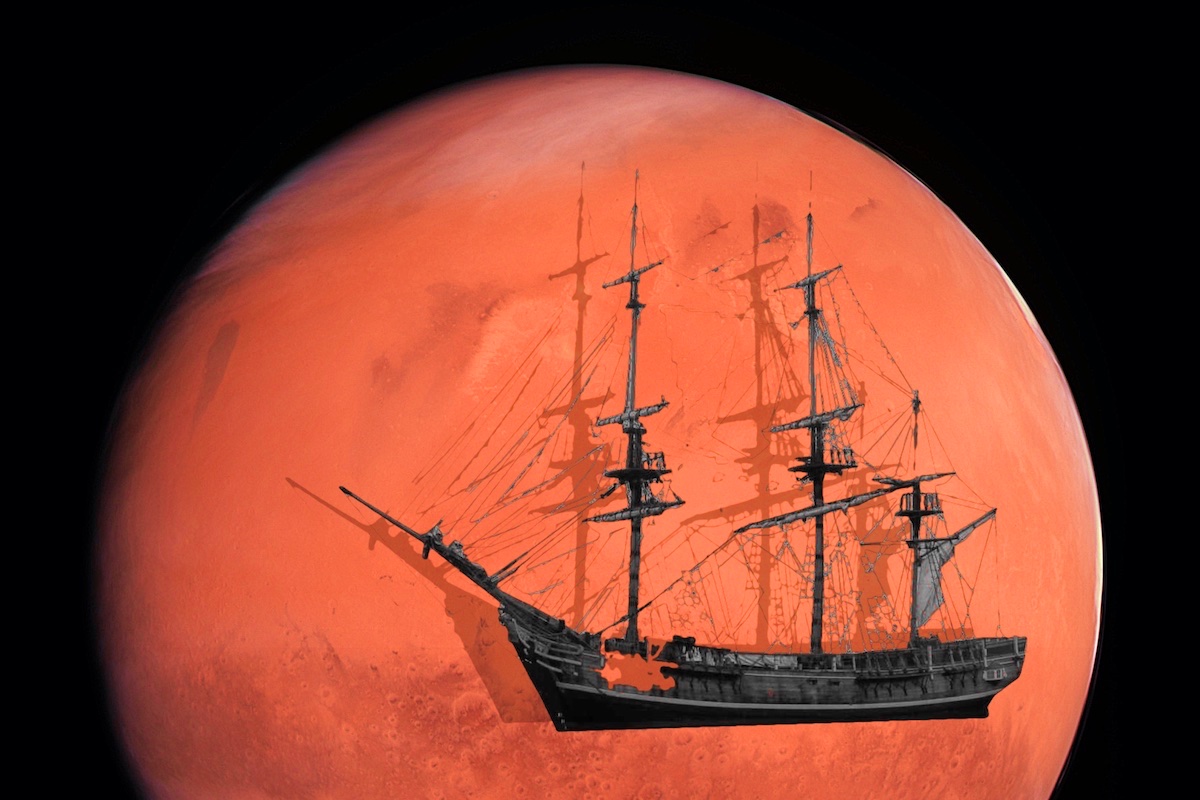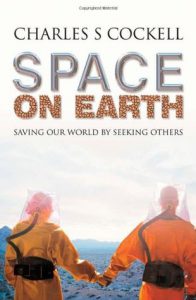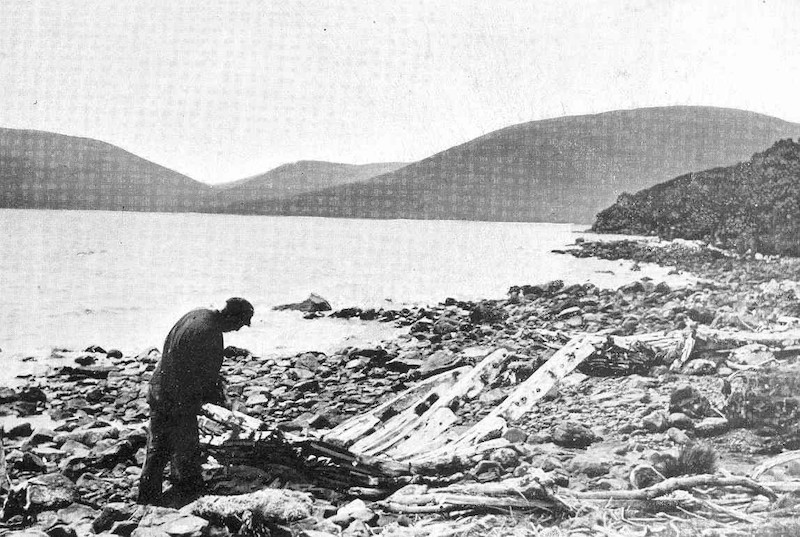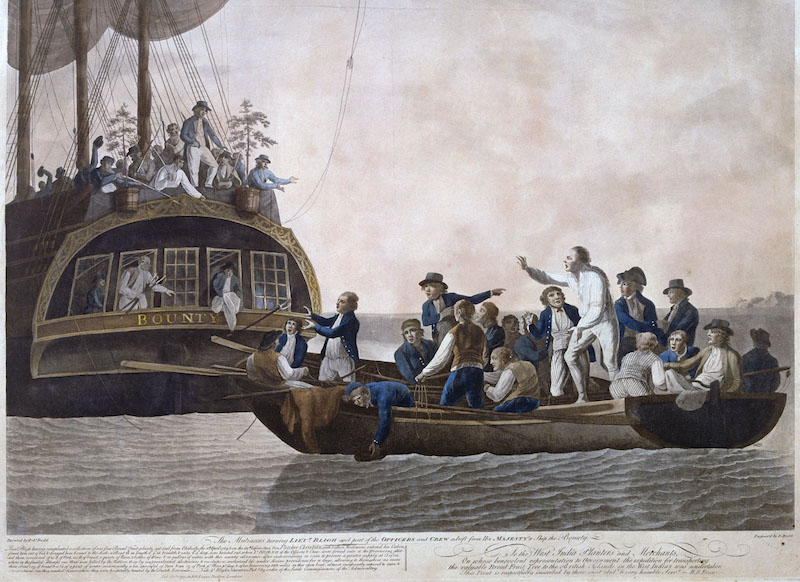Mars
Our Mission on Mars: Obey the Lessons of Mutiny on the Bounty
Setting aside for the moment the many physical and biological problems that must be overcome to establish a permanent base on Mars, it’s worth considering how one would govern such a remote colony.

On October 21, U.S. National Aeronautics and Space Administration (NASA) Administrator Jim Bridenstine told the House Committee on Science, Space and Technology that he foresees NASA will land astronauts on Mars by 2035. “We need to learn how to live and work in another world,” he told lawmakers. “Mars is the best place to prove those capabilities and technologies.”
The article that follows comprises the first instalment in “Our Martian Moment,” a multi-part Quillette series in which our authors discuss what kind of society humans should build on Mars if and when we succeed in colonizing the red planet. Our editors invite submissions to this series, which may be directed to [email protected].
In September, 2017, Elon Musk announced his intention to establish a Martian colony by the mid 2020s. “If there’s a third world war, we want to make sure there’s enough of a seed of human civilization somewhere else to bring it back and shorten the length of the dark ages,” he told an SXSW (South by Southwest) audience in March of 2018, while also admitting that the endeavor will be “difficult, dangerous, a good chance you’ll die.”
Setting aside for the moment the many physical and biological problems that must be overcome to establish a permanent base on Mars, it’s worth considering how one would govern such a remote colony. Curious to know his thoughts on the subject, I whimsically tweeted at the SpaceX CEO a few months later.
When you start the 1st Mars colony @elonmusk what documents would you recommend using to establish a governing system? U.S. Constitution/Bill of Rights? Universal Declaration of Human Rights? Humanist Manifesto? Atlas Shrugged? Against the State: An Anarcho-Capitalist Manifesto?
— Michael Shermer (@michaelshermer) June 16, 2018
To my surprise, I received this reply from Musk just a few minutes later:
Direct democracy by the people. Laws must be short, as there is trickery in length. Automatic expiration of rules to prevent death by bureaucracy. Any rule can be removed by 40% of people to overcome inertia. Freedom.
— Elon Musk (@elonmusk) June 16, 2018
There’s a lot packed into those 217 characters, but a tweet does not a constitution make. During that SXSW conference interview, when asked what type of government he envisions for the first Mars colony, Musk elaborated:
Most likely, the form of government on Mars would be somewhat of a direct democracy where people vote directly on issues instead of going through representative government. When the United States was formed representative government was the only thing that was logistically feasible. There was no way for people to communicate instantly. A lot of people didn’t have access to mailboxes, the post office was primitive. A lot of people couldn’t write. So you had to have some form of representative democracy or things just wouldn’t work at all. On Mars, everyone votes on every issue and that’s how it goes. There are a few things I’d recommend, which is keep laws short. Long laws…that’s like something suspicious going on if there’s long laws.
Musk’s sentiments about fewer laws and more freedom sound sensible. Can’t reasonable people get along with just a handful of rules, such as “don’t hurt other people and don’t take their stuff” (the title of Matt Kibbe’s 2014 libertarian manifesto) or golden rules like “do unto others as you would have them do unto you” (and its silver derivative, “don’t do to others what you don’t want done to yourself”)?
Unfortunately, no. Reasonable people—not to mention the unreasonable, of which there are plenty—can disagree on a great many things even when the rules are clear and simple. As James Madison wrote in Federalist Papers No. 51—written in the run-up to the creation of the United States, much as we are now in the early stages of discussing an analogue creation on the red planet—the problem originates with our species:
But what is government itself, but the greatest of all reflections on human nature? If men were angels, no government would be necessary. If angels were to govern men, neither external nor internal controls on government would be necessary. In framing a government which is to be administered by men over men, the great difficulty lies in this: you must first enable the government to control the governed; and in the next place oblige it to control itself.
A second reason why simple golden rules don’t work for large societies is that the number of different potential interactions (and, therefore, disagreements) among people multiply astronomically as population increases. Initial Martian colonies would be roughly the size of hunter-gatherer bands. And as UCLA geographer Jared Diamond has pointed out in his studies of the hunter-gatherer peoples of Papua New Guinea, even a small band of 20 people generates 190 possible dyads, or two-person interactions. That is a small enough number to permit an informal system of conflict resolution. But increase that 20 to 2,000 and you’re facing 1,999,000 possible dyads. Scale that up to cities of 200,000 or 2,000,000, and the potential for conflict continues to multiply exponentially.

That’s why complex societies have no choice but to create laws and regulations so as to ensure relative harmony among strangers. As Diamond explained in his 1996 book Guns, Germs, and Steel: “Once the threshold of ‘several hundred,’ below which everyone can know everyone else, has been crossed, increasing numbers of dyads become pairs of unrelated strangers. Hence, a large society that continues to leave conflict resolution to all of its members is guaranteed to blow up. That factor alone would explain why societies of thousands can exist only if they develop centralized authority to monopolize force and resolve conflict.”
Musk has said that “the threshold for a self-sustaining city on Mars…would be a million people.” That number generates nearly 500-billion dyadic combinatorial possibilities, meaning that any hoped-for manual of “short laws” would soon become tomes of bureaucratic legalese, much as with Earthly political and legal systems. Martian colonists will need to figure out how to prevent their bureaucracies from expanding in exactly the same way they have all over earth.
* * *
Let us say we are about to colonize the red planet and set up a permanent base there with the intention that it will grow into a sustainable civilization. Given that these space colonists will have roughly the same human natures as our Paleolithic colonists had when they undertook to spread their cultures around the Earth, we need to determine now what science has learned about how best to govern a civilization.

A number of scientists and science-fiction writers have thought long and hard about this problem. The University of Edinburgh astrophysicist Charles S. Cockell, for example, hosted a series of meetings with scientists and scholars from varied fields in two conference proceedings titled Human Governance Beyond Earth and The Meaning of Liberty Beyond Earth. To learn more about what to do when the most basic necessities of life—oxygen, water, and food—are under the control of one company (SpaceX?) or one government (the United States of Mars?), I spoke with Dr. Cockell by Skype, noting that Earthlings colonizing Mars will be operating in a very different environment as compared to Europeans colonizing North America.
“Space is an inherently tyranny-prone environment,” Cockell told me. “You are living in an environment where the oxygen you breathe is being produced by a machine.” On Earth, he notes, governments can rob their people of food and water, “but they can’t take away your air, so you can run off into a forest and plan revolution, and you can get your friends together and you can try to overthrow a government.”
In habitats on the moon or Mars where oxygen production is controlled by a single entity, there must be some guarantee that the air supply cannot be cut off to citizens. It would seem, then, that common ownership of the air and the machines that produce it through a single entity would follow, and I suggested as much to Cockell. But to my surprise, he told me that he “would go in completely the opposite direction. I would fragment as much as possible. I would try to create plurality in the means of production and great competition and have many people able to produce oxygen. So what you’re trying to do is decentralize,” because “centrally planned governments generally end up as not very good experiments.”
What about corporations that capture a majority market share and become so dominant that they create a monopoly and turn tyrannical, I inquired? “Well, these things happen on the Earth,” Cockell historicized, noting that documents like the Bill of Rights are designed to keep tyranny in check. True, but not without violence, revolutions, and wars, I rejoined. “It’s hard work to get people to believe in freedom and to fight for it,” Cockell admitted, “and I think in space it’s going to be even more hard work. So you’ve got to give people freedom of movement, freedom of information—it’s really no different from the Earth, it’s just a more expanded and more vigorous of what we need to do on the Earth to maintain freedom.”
Among the new ideas Cockell and his colleagues came up with is modularity—literally incorporating liberty into architecture.
“You could modularize a settlement so that there’s lots of oxygen-production machines, lots of food-production machines, such that the failure of any one of them does not threaten the whole settlement.” Decentralization “allows people to do their own thing. The disasters happen when you try to artificially construct societies that are wholly controlled from the center or where there’s no organization and you create an anarchic society. The best forms of society have always been ones that are flexible, and modify themselves over time as fashions and ideas change, and that’s why, I think, Western democracies are reasonably successful at keeping people happy to the maximum extent you can try and do that. And I think in space there is going to be nothing different there.”
* * *
The ideas I have discussed thus far pertain to the idea of a Martian society that has grown to the size of a city or small country. But what about our hypothetical Martin colony in its earliest stages, when it is populated by just a few thousand, or perhaps even a few hundred, rugged souls waiting out the long years between supply ships? In this phase of the operation, lessons from the Federalist Papers may be less useful than lessons from what may be called unintentional communities, such as shipwrecked sailors stranded on remote islands. These are explored by the evolutionary sociologist Nicholas Christakis in his 2019 book Blueprint: The Evolutionary Origins of a Good Society (recently excerpted in Quillette).
At the core of all good societies, theorizes Christakis, is a suite of eight social characteristics, including: (1) The capacity to have and recognize individual identity; (2) Love for partners and offspring; (3) Friendship; (4) Social networks; (5) Co-operation; (6) Preference for one’s own group (“in-group bias”); (7) Mild hierarchy (that is, relative egalitarianism); and (8) Social learning and teaching.
To test this hypothesis, Christakis analyzed a database of shipwreck survivors over a 400-year span from 1500 to 1900, with initial survival colony populations ranging from four to 500, with a mean of 119. (The number of rescued survivors ranged from three to 289, with a mean of 59.) The duration of these unplanned societies ranged from two months to fifteen years, with a mean of twenty months.

Some of the survivors killed and ate each other, while others survived and flourished. What made the difference? “The groups that typically fared best were those that had good leadership in the form of mild hierarchy (without any brutality), friendships among the survivors, and evidence of co-operation and altruism,” Christakis concludes. The successful shipwreck societies shared food equitably, took care of the sick and injured survivors, and worked together digging wells, burying the dead, building fires and building escape boats. There was little hierarchy…While on board their ships, officers and enlisted men were separated, but on land, successful castaways integrated everyone in a co-operative, egalitarian and more horizontal structure.”
The closest thing to a controlled experiment in this category was when two ships (the Invercauld and the Grafton) wrecked on the same island (Auckland) at the same time in 1864. The island is 26 miles long and 16 miles wide, and lies 290 miles south of New Zealand—truly isolated. Members of the two surviving groups were unaware of one another, and their outcomes were starkly different.
For the Invercauld, 19 out of 25 crew members made it to the island but only three survived till rescue a year later, whereas all five of the Grafton crew were rescued two years after they were shipwrecked. “The differential survival of the two groups may be ascribed to differences in initial salvage and differences in leadership, but it was also due to differences in social arrangements,” Christakis explains. “Among the Invercauld crews, there was an ‘every man for himself’ attitude, whereas the men of the Grafton were co-operators.” Take note, future Martians.

Arguably the most famous of these unintentional communities began taking form in the early morning hours of April 28, 1789, when Fletcher Christian, a Master’s Mate and acting lieutenant on the HMS Bounty, seized control of the ship from Captain William Bligh. Christian released the captives into a 23-foot launch (all but one of these men would survive), and sailed the Bounty into the mists of history. A decade later, when the only surviving mutineer, John Adams, was found on Pitcairn Island, he would relate a cautionary tale for future Martians about how not to set up a new society.
The Bounty originally had departed Portsmouth on December 23, 1787. Ten months and 27,010 miles later, it arrived in Matavai Bay, Tahiti, where it was anchored for five months, plenty of time for the young male crew members—along with Christian, the leading mutineer—to become romantically involved with native women. After departing Tahiti, a number of the smitten men grew restless without their love interests, and bristled under the discipline imposed on them by Bligh for relatively minor offenses. This is what led to the explosive response that fateful April morning in 1789.
After seizing the ship, Christian and his followers returned to Tahiti (folllwing a brief and bloody attempt to settle on the island of Tubuai). But on September 23, 1789, they left Tahiti for good, knowing that death awaiated them when the Royal Navy tracked them down. At this point, the Bounty was carrying a total of nine male mutineers, six Tahitian men, and eleven Tahitian women. On January 15, 1790, they arrived at one of the remotest rocks in the Pacific, Pitcairn Island. There, they unloaded the ship, and later torched it in a final gesture of commitment to their new life on this far-flung outpost.

The seeds of failure already were apparent in the sex ratio: 15 men, 11 women. Not good. After three years, the woman living with mutineer John Williams died, so he took the wife of one of the Polynesian men, leading to jealousy, violence and, on September 20, 1793, retribution. Five of the mutineers ended up dead, including Christian, along with all of the Polynesian men. In the years after the massacre, one mutineer committed suicide, another was murdered, and another died of asthma. By 1808, the only male survivor was Adams, who told the tale of the Bounty’s fate and the horrors of Pitcairn Island in the years following his discovery by American sealers in 1808. (He lived until 1829, and eventually was granted amnesty for his role in the mutiny.)
The mutineers failed to find the right balance between hierarchy and egalitarianism. Both Bligh and Christian were products of the Royal Navy, very much steeped in its rigid protocols. On the Bounty, it was the hierarchical tensions between Bligh and Christian that led to the mutiny. And on Pitcairn island, corresponding tensions between Christian and the mutineers, and between the mutineers and the male Taitians, when added to the sex-ratio imbalance and accompanying jealousy and violence, led to almost everyone’s demise.
The lessons from Pitcairn are clear enough: Start off with a balanced sex ratio, structure a political system more horizontal than hierarchical, eliminate bigotted attitudes, and accentuate co-operation and attenuate competition.
* * *
Martian political, economic and legal institutions likely will vary from their Earthly counterparts according to the basic needs of the first colonists. But any such variation will necessarily be bounded by human nature. Perhaps SpaceX or NASA will create a division of Social Engineers—a team of legal scholars, political scientists, economists, social psychologists and conflict-resolution scholars—and they’ll come up with a wholly different system of governance.
Or maybe the Martian colonists themselves will think of something new as they experiment with different solutions to social problems. Who knows what that seed might sprout in the coming centuries and millennia? The prospects of a new form of government being discovered on Mars and exported back to Earth makes any such exploratory mission to the red planet seem worthwhile.
Either way, Governing Mars is also an analogue for Governing Earth, inasmuch as we do not yet have the final answers that will ensure the survival of our own civilization. As Charles Krauthammer reflected in his 2013 book Things that Matter, it doesn’t matter if you have “the most advanced and efflorescent of cultures.” If you get the politics wrong, “everything stands to be swept away.”






